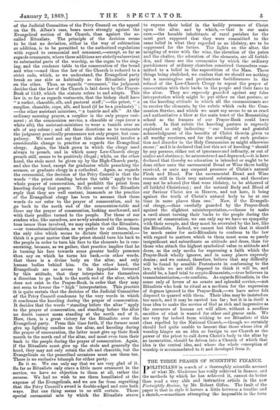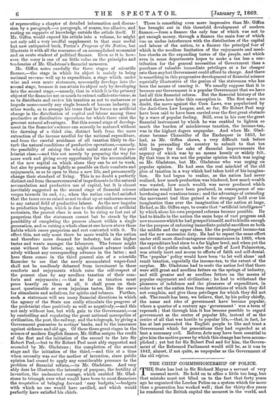THE THREE PHASES OF SCIENTIFIC FINANCE.
pOLITICIANS in search of a thoroughly scientific account of what Mr. Gladstone has really achieved in finance, and the methods by which he has achieved it, cannot do better than read a very able and instructive article in the netv Fortnightly Review, by Mr. Robert Giffen. The fault of the paper is that in style it hovers a little between a treatise and a sketch,—sometimes attempting the impossible in the form of representing a chapter of detailed information and discussion by a paragraph,—a paragraph, of course, too allusive, and resting on supports of knowledge outside the article itself. If Mr. Giffen would expand his article into a volume, he might not only add a very needful supplement to that once useful but now antiquated book, Porter's Progress of the Nation, but illustrate it with all the resources of an accomplished economist and an acute student of political finance. Even as it is, however, the essay is one of no little value on the principles and tendencies of Mr. Gladstone's financial measures.
Mr. Giffen notes carefully the three stages of scientific finance,—the stage in which its object is mainly to bring national revenue well up to expenditure, a stage which, under wise and even acute statesmen, necessarily develops into the second stage, because it can attain its object only by developing into the second stage,—namely, that in which it is the primary object of the financier not so much to extract sufficient revenue, as so to distribute and review his taxation as not to embarrass or impede unnecessarily any single branch of human industry, in other words, so to arrange his taxes that he forces no artificial change in the distribution of capital and labour among those productive or distributive operations for which there exist the greatest natural advantages. But this second stage of development in the financier's science can scarcely be matured without the dawning of a third aim, distinct both from the mere extraction of the income needful for the national expenditure, and from the careful avoidance of all taxation likely to disturb the natural conditions of productive operations,—namely, the possibility of raising the whole social status of the proletariat class,—and this not merely by preparing the way for more work and giving every opportunity for the accumulation of the new capital on which alone they can be set to work, but also by pressing as lightly as possible on their comforts and enjoyments, so as to open to them a new life, and permanently change their standard of living. This is no doubt a perfectly distinct end from the mere removalof impediments to the natural accumulation and productive use of capital, but it is almost inevitably suggested as the second stage of financial science verges towards its end, i.e., when the nation can feel satisfied that the taxes are so raised as not to shut up or embarrass access to any natural field of productive labour. As the new impulse to production begins, which is due to the abolition of artificial restraints, the poorest class is seen to be rising so fast out of pauperism that the statesman cannot but be struck by the possibility of completing the process almost within a single generation, and so raising a whole class at one heave above those habits which cause pauperism and rest contented with it. To effect this, not only must there be more wealth in the nation and therefore more demand for industry, but also higher tastes and wants amongst the labourers. The former might exist without the latter, nay, might almost advance indefinitely without any corresponding advance in the latter ; and here there comes in the third general aim of a scientific financier to see that the newly accumulated wages-fund shall not be needlessly debarred from investment in those comforts and enjoyments which raise the self-respect of the poorest class by any needless taxation of their comforts and enjoyments ; — that so far as taxation must press heavily on them at all, it shall press on their most questionable or even injurions tastes, like the crave for stimulants and sedatives, for spirits and tobacco. Further, such .a statesman will see many financial directions in which the agency of the State can really stimulate the progress of the proletariat class positively as well as negatively,—and this not only without loss, but with gain to the Government,—as by controlling and regulating the great national monopolies of civilization, the post, the railway, and the telegraph, by giving a Government guarantee to savings' banks, and to the insurance against sickness and old age. Of these three great stages in the science of modern English finance, Mr. Giffen assigns the credit of the first and the initiation of the second to the late Sir Robert Peel,—but to Sir Robert Peel most ably supported and seconded by Mr. Gladstone ; the completion of the second stage and the initiation of the third,—and this at a time when necessity was not the mother of invention, since public opinion had ceased to apply any considerable pressure to the problem of financial reform,—to Mr. Gladstone. And very ably does he illustrate the intensity of purpose, the fertility of invention, the undaunted courage, which enabled Mr. Gladstone to triumph over what would have been to most financiers the temptation of bringing forward easy budgets,'—budgets with which no one would have cavilled, and which would perfectly have satisfied his chiefs. There is something even more impressive than Mr. Giffen has brought out in this threefold development of modern finance,—from a finance the only fear of which was not to get enough money, through a finance the main fear of which was an undue interference with the distribution of the capital and labour of the nation, to a finance the principal fear of which is the needless limitation of the enjoyments and needless checks on the expanding tastes of the people, and which even in some departments hopes to make a tax less a contribution for the general necessities of Government than a purchase of valuable immediate privileges at a far cheaperrate than anybut Government could afford to charge. And there is something in this progressive development of financial science especially illustrative of the genius of the statesman who hasbeen the means of causing it. We usually suppose that it because our Government is a popular Government that we havehad all this financial reform. But the financial history of the period shows how false this conception is. The first move, nodoubt, the move against the Corn Laws, was popularized by the Anti-Corn Law League, and, so far, Sir Robert Peel may have been said to have been carried over the first great obstacle' by a wave of popular feeling. Still, even in his case the great. financial instrument by which he was enabled to lighten somuch the burden of mischievous taxation, the income-tax, was in the highest degree unpopular. And when Mr. Gladstone became Chancellor of the Exchequer in 1853, he' had, as Mr. Giffen shows, a very difficult task before him in persuading the country to submit to that tax still longer for the sake of financial improvements the urgency of which was by no means keenly or widely felt. By that time it was not the popular opinion which was urging on Mr. Gladstone, but Mr. Gladstone who was urging on popular opinion. He had seen the real mischief of the old plan of taxation in a way which had taken hold of his imagination. He had begun to realize, as the nation had never realized, how much production was hindered, how much wealth was wasted, how much wealth was never produced which otherwise would have been produced, in consequence of embarrassing and vexatious taxes ; and the advantage of extending the movement had thus gained a far stronger hold over his imagination than over the imagination of the nation at large.. He had, as Mr. Giffen says, to create that "artificial intelligence" by which alone his own proposed reforms became possible. He had to kindle in the nation the same hope of vast progress and new resources which he had grasped himself, and to kindle enough for the purpose of enforcing immediate painful sacrifices on both the middle and the upper class, like the prolonged income-tax. and the new succession duty. He had to repeat the same effort under still more disadvantageous circumstances in 1860, .when the expenditure had risen to a far higher level, and when yet the mood of the public mind, under the spell of Lord Palmerston,. was utterly inert and averse to efforts of faith and self-denial. The 'popular' policy would have been to let well alone' and remit taxation, especially the income-tax, to the extent of the Mr. Gladstone had to make the nation feel that there were still great and needless fetters on the springs of industry, and still greater and as needless fetters on the means of popular enjoyment and civilization ; he had to withstand the pleasures of indolence and the pleasures of expenditure, in order to set the nation free from restrictions of which they did not complain, and give them privileges for which they did notask. The result has been, we believe, that, by his policy chiefly, the name and idea of government have become popular,. where a quarter of a century ago 'government' was a term of reproach ; that through him it has become possible to regard government as the centre of popular life, instead of as the centre of all that was hostile to popular life,—that, in fact, he has at last persuaded the English people to like and trust a Government which for generations they had regarded as at best a necessary evil. Reform Acts may have been essential to give him the motive power by which this change has been accomplished; yet but for Sir Robert Peel and for him, the Government of the Reformed Parliament would still be, as it xras in 1842, almost, if not quite, as unpopular as the Government of the old regime.











































 Previous page
Previous page